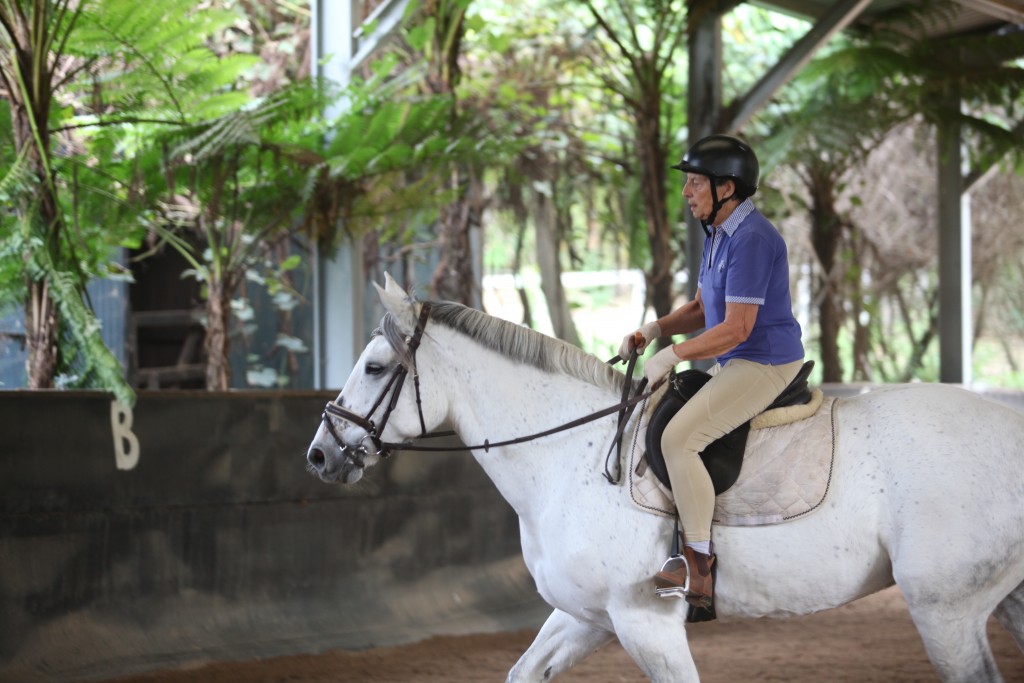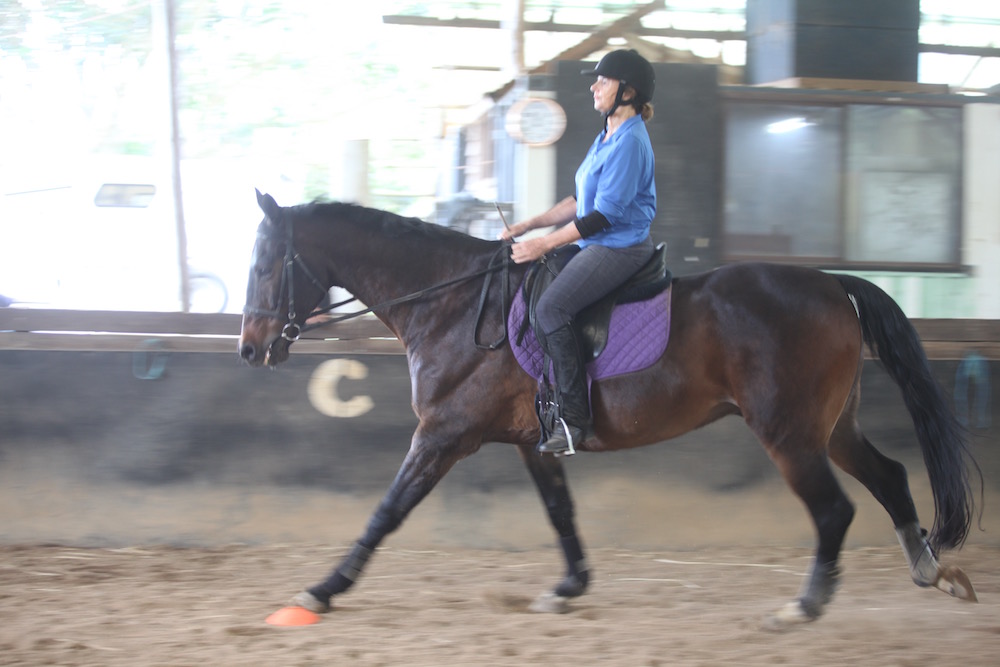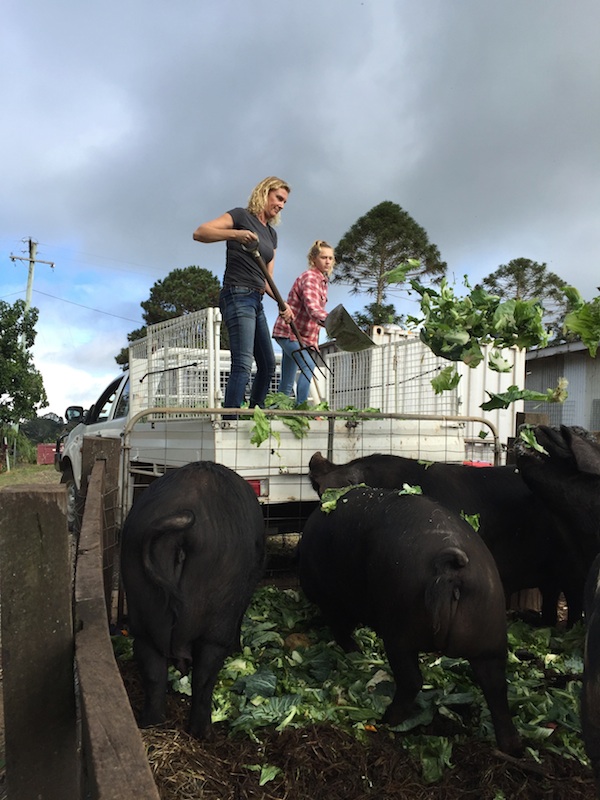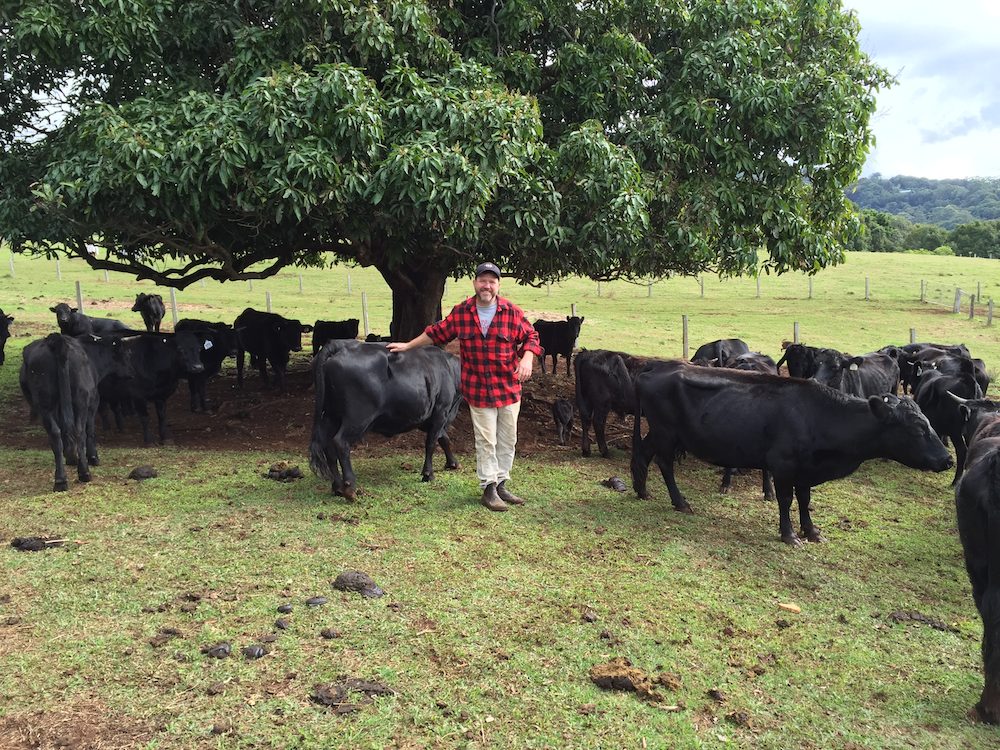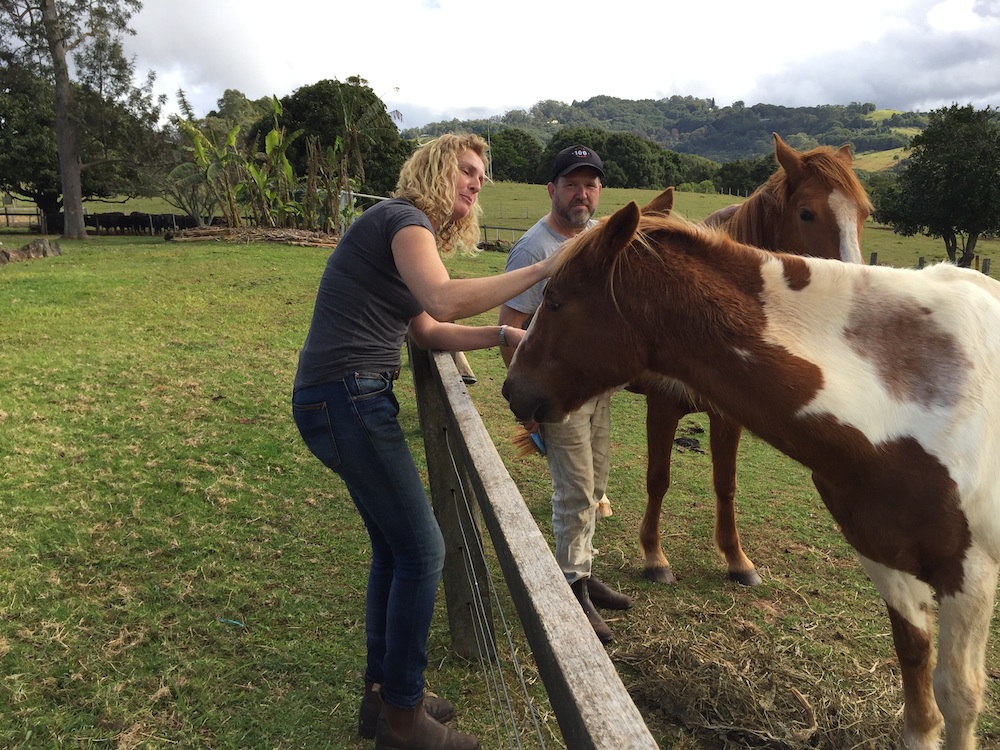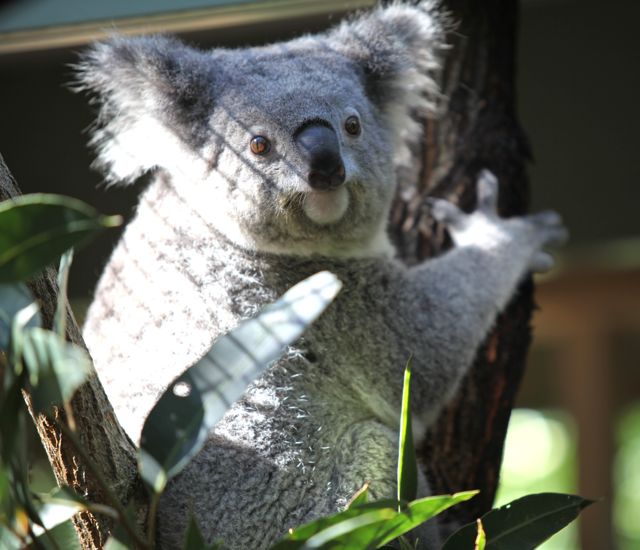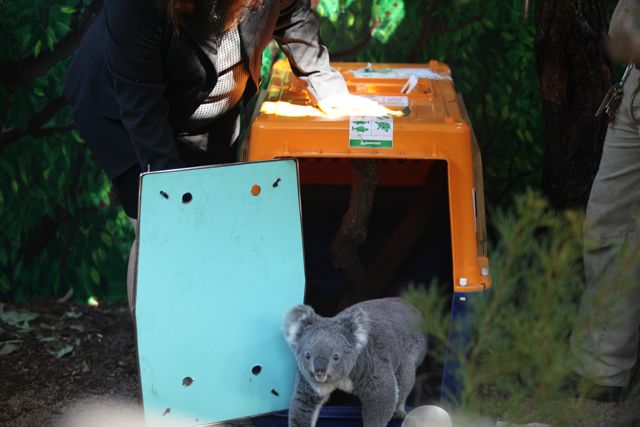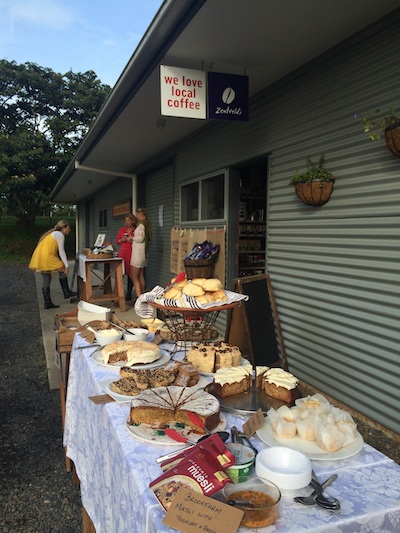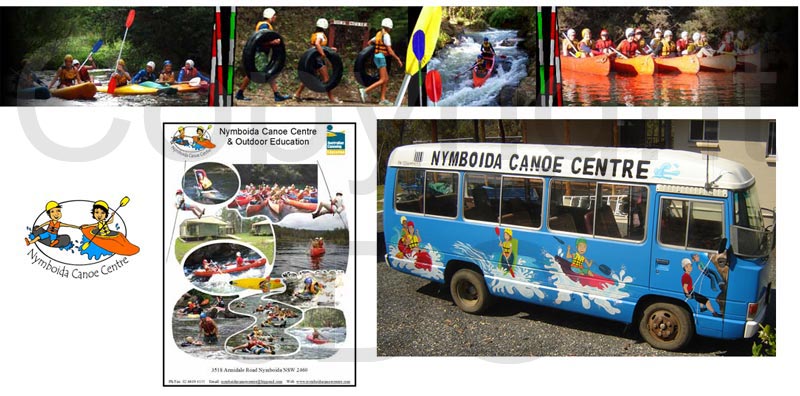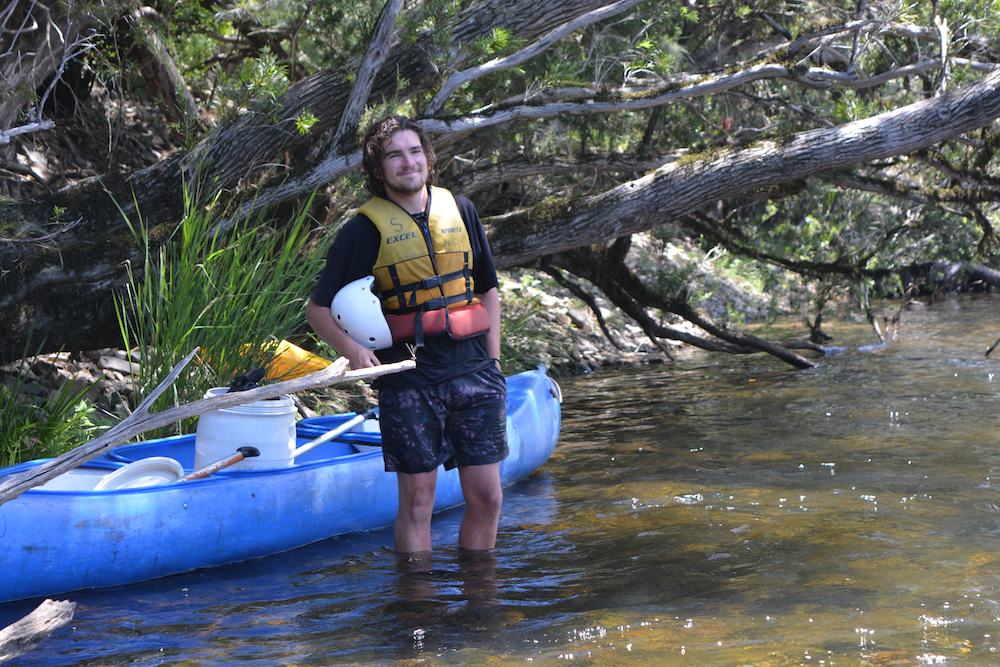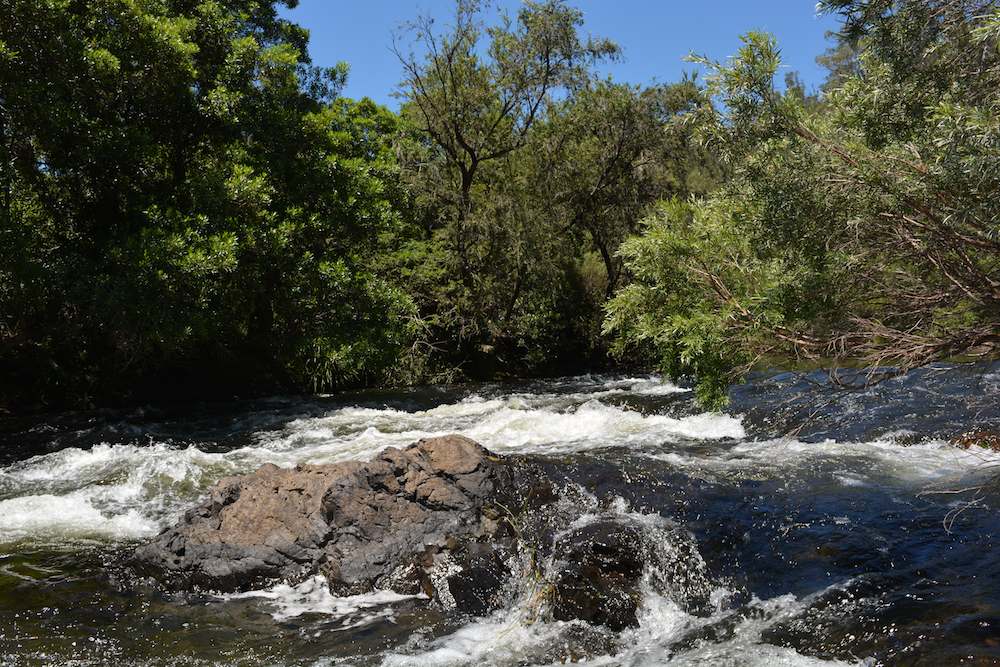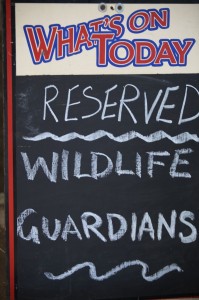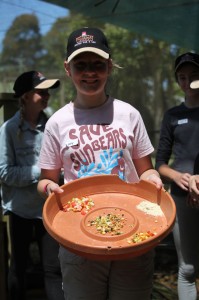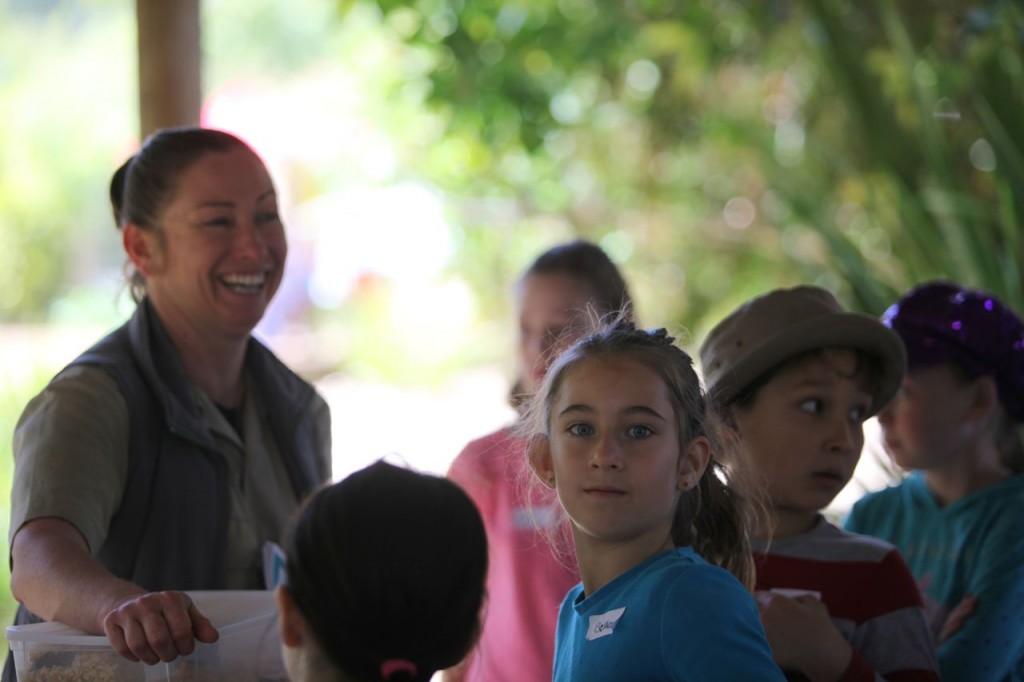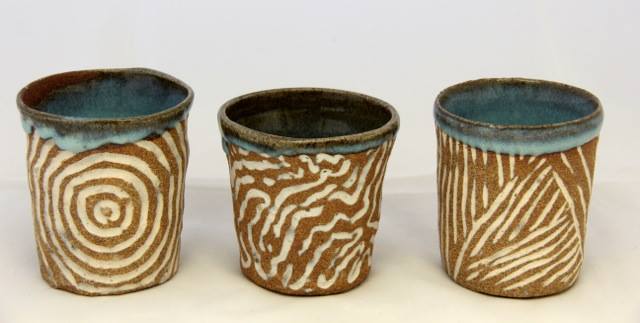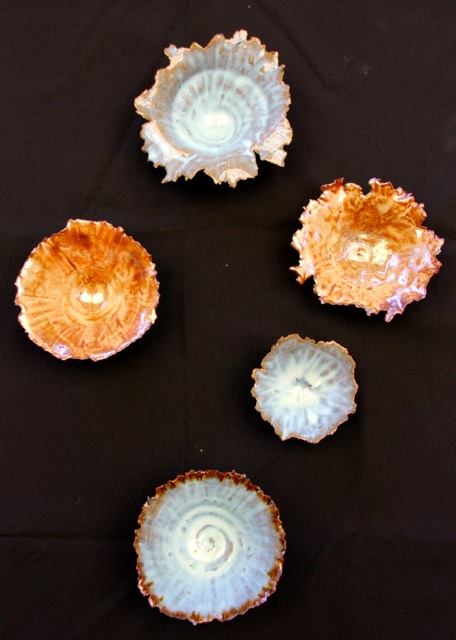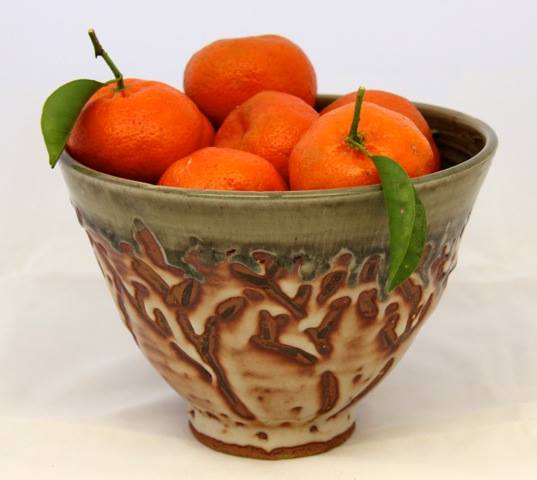The post Myall Creek Massacre Remembered appeared first on .
]]>“I was honoured to be at the Myall Creek Memorial,” says Alex. “Around 500 people gathered at Myall Creek near Bingara to commemorate the 180th anniversary of the massacre that took place in 1838. While there were many many massacres during the frontier wars, Myall Creek was significant in that it was the first time that Europeans were brought to justice for the killing of Aboriginal people in Australia’s history.”
Bingara is a small town on the Gwydir River in Murchison County in the New England region of New South Wales and to mark the occasion a traditional possum cloak was created. “It was displayed at the ceremony,” says Alex, “and it was extremely powerful.”

Carol Sparks, deputy mayor of Glen Innes Severn Shire; Jasmine Knight-Smith and Adele Chapman-Burgess, member of the Myall Creek Memorial committee with the possum skin cloak. Photo: Alex Clarke.
In the past some tribes traditionally wrapped their babies in possum skins. As the children grew more skins were added and decorated with personal stories and connections to country. (Somewhat ironically, the 30 possum skins used for the Myall Creek Memorial gathering cloak had to be imported from New Zealand as it is illegal to kill possums in Australia.) The song-lines on the cloak fan out to represent the song-lines from Boggabilla at the border to Glen Innes in the New England tableands – one of the travelling routes of the Aborigines killed in the massacre. It also features stories of people such as Adele Chapman-Burgess, a member of the National Friends of the Myall Creek Memorial, and one of the artists who helped create the cloak.

Aunty Sue Blacklock, Kamilaroi elder and descendent of the Myall Creek Massacre survivors. Photo: Alex Clarke.
“We won’t forget but we will forgive, and walk down that path together,” said Aunty Sue Blacklock, who can trace her history back to survivors of the massacre. Invited to visit the Myall Creek Station, she’d found it still to hold powerful memories. “If you stood on one place, to me it’s like I could hear the screams,” she said. “It was very quiet, there was no noise, It was just like the wind was bringing their screams as it blew, I could feel their hurt.”
“It was an extraordinary experience to be at the ceremony,” says Alex, whose photographs are a moving testament to the day.







Visitors to the anniversary included Walt Secord, Shadow Minister for Health, Shadow Minister for the Arts, and Shadow Minister for the North Coast, Deputy Leader of the Opposition in the Legislative Council, who announned Labor’s promise of $3 million for a cultural museum at the site of the Myall Creek Memorial should Labor be elected.
The post Myall Creek Massacre Remembered appeared first on .
]]>The post 75 – and she’s still tall in the saddle appeared first on .
]]>I feel a bit ashamed of myself to be honest. I think it was about four years ago, in my late fifties, when I began to complain a bit about a slightly arthritic right hip that was preventing me from hopping on and off a horse in quite the style I’d been used to, and I started to talk about whether it was time to give up riding altogether.
But recently I met Janet Edgerton, and I have to say – I’ve been somewhat silent on the subject of riding, and ageing, because at the age of 75 (it was her birthday a few weeks ago), Janet is riding on a weekly basis, and not only that, but she came back to it after a 36-year-break.
I’m standing on the sidelines of the arena at the Byron Bay Equestrian Centre watching Janet and her fellow rider, Beeb Fleetwood, a mere 64, going through their paces on two of Tesse’s most precious horses. Beeb is on, Junior, a somewhat ironically named massive 16.3hh warmblood, and Janet is on Lucy, Tesse’s own personal Percheron.
As I watch, Janet urges Lucy into a canter, and Tesse is giving her encouragement. “Keep your leg on,” she urges, “don’t let her fall out – well done!”
I’m catching the end of the lesson and Beeb and Janet are going through their final paces. I’m impressed, not least because I suspect I wouldn’t last 20 minutes without gasping for breath, but afterwards when I talk to Janet about her late re-entry into her best-loved hobby, I’m not surprised at how fit she is. “I ride every week,” she tells me, “but I also ride my bike, do a one-kilometre swim a couple of times a week, and play badminton twice a week, so I’m pretty healthy and fit.”
Pretty healthy and fit doesn’t even begin to cover it really – but I do wonder why Janet came back to riding after so many years away from it.
“I grew up in England with horses,” she says, “we were into hunting and showjumping, and I competed until I was in my twenties, and rode until I was 37. But then I met my husband over in the UK, who was Australian, and we had three children, all of them born over there, and life just simply got too busy. He was keen that we try living in Australia and so we moved here in 1984.”
At first Janet wasn’t sure if Australia was for her. “It took me about a year to settle in,” she says, “it was so different. We settled up near Pottsville, but somehow life was so busy there never seemed to be time to ride or get into it properly. It wasn’t until a couple of years ago that I was talking with Beeb about her lesson down here, and she suggested that I come along.”
Janet took her time – checking out the centre, and watching a couple of lessons, until in March last year, she had her first half-hour lesson. “I took to it like a duck to water,” she said. “I do think it’s a bit like riding a bike – you never forget. Now it’s a highlight of my week and I really look forward to coming down and sharing my lesson with Beeb.”
Beeb Fleetwood, Janet’s lesson partner, also came from a horse background. Beeb grew up on a farm in Western Victoria, and like many kids do, started off small. “I learnt to ride on a Shetland pony, as you do,” she laughs, “and I progressed through Pony Club and onto bigger ponies and horses. I continued to ride intermittently on the farm into my teens and twenties, and then when I was older started doing some trail riding in the High Country which I really loved. Later on I did a bit of Adult Riding Club, and I also used to have lessons, but for me it was always more about the trail.”
Despite her love of trail-riding though, what prompted Beeb to go to the Byron Bay Equestrian Centre was initially to ride with a friend of hers who was coming back to riding after a tragedy many years ago when her father had died after a fall from her horse. “I wanted to ride with this friend to keep her company,” she says, “but at the same time some friends of mine were beginning to go on these worldwide riding adventures and I really wanted to start doing some of them, but I’d always lacked a bit of confidence in my style of riding, so I decided that getting some lessons was a good way to improve my aides.” Beeb soon found a six-day ride in Sicily which she loved. On the ride, Beeb was in the saddle for six-eight hours a day, but thanks to her regular lessons she felt fit enough to handle it. “I loved it so much I’m going again,” she says. “I’m really hooked on the adventure of it.”
It was Tesse who suggested to Janet and Beeb (whose friend didn’t continue) that they have their lessons together and for both of them it’s been a rewarding experience.
And not just for them. “To see the pair of them so passionate about horses gives me something to look forward to,” says Tesse. “They’re literally my idols. When Janet first came she was walking on a horse for just five minutes, three or four months later I put her onto Lucy, my own horse, and the next moment she was thundering around the arena with the biggest smile on her face, and galloping as if she was on a hunt! She got severely reprimanded! But it was also very funny and entertaining. I’m so happy that her confidence has built up so much. Beeb had a lot of deep-seated issues with her parents telling her that she wasn’t good enough, and she’s physically improved out of sight. She has a beautiful natural seat and all the natural ability there – it was just teaching her that she had it, and she became an amazing rider.”
As for Janet, she’s got no plans to hang up her boots and spurs just yet. “I just feel that while I’m enjoying it, why not keep on doing it?” she says.
As I head home, I think of Elyne Mitchell, author of The Silver Brumby, who was still riding only a few years before she died at the age of 89. Time to put up or shut up I think to myself, after all, if I play my cards right, at the age of 62 I could have 20 years of riding left. Time to get going.
Photos: Candida Baker
To contact Tesse Ferguson, owner and manager of the Byron Bay Equestrian Centre go to: byronbayequestriancentre.com
The post 75 – and she’s still tall in the saddle appeared first on .
]]>The post Black pigs and Blundstones – all part of the Cromwell Family Farm appeared first on .
]]>EVERY morning Greg Cromwell drives from the Goonengerry property he farms with his wife Alison and three daughters to load up their ute with fresh produce thrown out by the two local Woolworths supermarkets. The mound of fruit and veg is destined for the several dozen heritage pigs the Cromwells breed and raise, along with cattle, kelpies, chooks and native stingless bees.
On the day I’m there to visit the English Large Blacks know what’s coming and squeal with excitement. It’s a feast and they launch in to the aromatic mess, nosing out and crunching the sweet melons and mangoes first, chomping away in a porcine feeding frenzy.
Their gourmet lunches make the Large Blacks even larger (some need to be put onto light rations) while the diversity in their diet means they’re healthy and content. Already a calm breed, they’re even easier to manage with their happy Northern Rivers lifestyle – a plus for any farmer. The same applies to cromwellfarms mob of cattle – about 40 Dexters, a breed chosen mainly for their placid nature.
While three-hour trip is barely worth what is saved in feed costs, it routinely includes other collections: at Byron Bay’s industrial estate Greg (or sometimes Alison) picks up sacks of spinach stalks from Byron Bay Pizza Co, coffee “chaff” from Marvell St Coffee Roasters, and mulch-worthy sawdust from furniture maker Jeremy Lee’s workshop.
Besides, the Woolies “waste” produce would otherwise become landfill, Greg says. This way, about 100 tonne a year of it, plus 10 more or so from each of the Shire’s major music festivals, gets “turned into bacon”. And of course the varied diet makes them, in turn, even tastier.
Driving it all is the burly Canadian’s restless entrepreneurial spirit – fomenting ideas, building relationships, creating efficiencies and synergies – combined with the couple’s passion for family farming and a deep-seated love of the land.
It’s in their blood. Though Greg grew up in Toronto, any leisure time was spent in the country, on farms or hunting and fishing with his grandfather. His mother’s people began farming in Ontario in the 1850s and she still lives in the farmhouse built by her great grandfather. Alison’s dad was a farmer and becoming one was always something of a dream for her.
Though Greg denies being “a greenie”, one major goal is to leave the planet a better place, fulfilling an obligation to be the optimum stewards of the acreage the Cromwells know they are privileged to own. The cattle are on constant paddock rotation and have been chemical-free for a year, with the goal being to go fully organic.
The couple met in Toronto in the early 90s and in 2000 they left the city to farm in remote country before coming to Australia, where Alison was raised (also in Toronto – although this Toronto was a suburb of Lake Macquarie). They rented, bought a small holding and a few animals, then acquired the old Sheaffe’s farm with a view to bringing it back into production.
It’s been a success. As breeders they supply piglets to individual buyers, or to The Farm at Ewingsdale, where they are something of a tourist attraction – though their ultimate destination is in dishes created by the 3 Blue Ducks restaurant there. Or, following the attentions of abattoirs at Booyong and Casino, and the Clunes butcher, they become in-demand delicacies on the menu at Harvest in Newrybar, the Bangalow Bowlo’s Stockpot Kitchen (250 serves in one night), Byron’s 100 Mile Table or Black Sombrero in Lismore. Cromwell beef, chicken and fresh produce are also in big demand amongst the region’s respected eateries.
But while the farming is varied, it’s small scale, and only viable because of parallel business activities. The Sheaffes Road property is also HQ for several companies, all having their genesis in Greg’s start-up savvy.
His first real job was selling Telex machines and he gained an “intimate knowledge” of IBM’s early 029 card punching machine, then a comprehensive knowledge of beer during 10 years with the Upper Canada Brewing Co, helping to take the company public (and doing himself out of a job). Marketing beer and helping grow the fledgling Steam Whistle Brewing with two other “fired guys”, he became something of a high-flier, on the board of the Toronto Arts Council and the city’s Fringe Festival. Meeting Leonard Cohen was a highlight. But it wasn’t all plain sailing and he admits to having had business failures and a few real estate calamities. “They all helped to build resilience,” he says. Over the years the entrepreneurial eye has become finely honed, meaning he often seems to be in the right place at the right time.
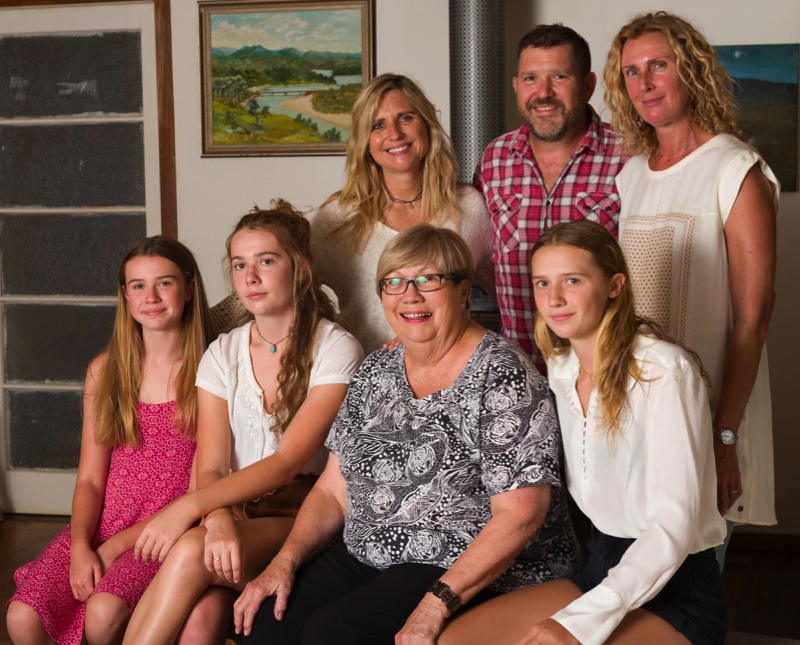
The Cromwell Family are all involved in making the business work. Standing from left: Greg’s sister, Karyn Cromwell Scarpa, Greg Cromwell and his wife Alison; seated, Bella, Aubrey, Greg’s mother Eleanor and Morley. Photo: Richard Johnson
While honeymooning with Alison in Tasmania, he came across Blundstone workboots for the first time and began making inquiries. Within a couple of years, they had exclusive rights to distribute Blundstones in Canada, and to retail RM Williams boots there as well. The Canadians love them and now the Cromwell’s three Australian Boot Company stores sell hundreds of thousand of pairs there. “It’s a big deal, and has allowed us to have some freedom to undertake new ventures here,” Greg says.
They also import and distribute a range of stylish coffee-making products, most notably the ROK Unplugged Espresso kit that allows aficionados to grind their own beans and make, sans electricity, a personalised cup of coffee, silently and with a warm glow of satisfaction.
They have their own coffee blend too, under the Top Shed label and are in the process of planting 100 coffee trees. With a large roasting machine already purchased, they are looking for a site to do their own processing through a new venture, The Coffee Agency. Beer-making is also in the pipeline, with a sort of “bake, roast and brew centre” envisaged for the property. A line of organic maple syrup is another possibility. (Enter the code Verandah 10 on the website to receive a 10% discount on the Espresso Unplugged coffee maker and grinder espressounplugged).
But none of this would be possible without the family showing a remarkable teamwork. Everyone pitches in, and with a grasshopper-minded dad whose personal motto is ‘fire, ready, aim,’ they need to be ready to hop to at a moment’s notice. “Alison and the girls make it all happen,” Greg says. “Without their capabilities and enthusiasm, this wouldn’t be possible.” Alison is the principal carer of the five horses on the property, including the latest acquisition, Bobbin. The three-year-old female brumby is a rescue horse from the Guy Fawkes Heritage Horse Association, yet to be ridden but settling in nicely.
The three teenage girls all fill significant roles in both the business and the hands-on side of the running of the property, including organising the farm’s beef and pork pop-up days, which attract up to 120 hungry guests.
“They set it all up, do all the selling, take visitors on tour, keep an eye on their children,” Greg says. “They’ve been empowered by their experience here.”
Morley, 16, has shown a talent for marketing, mastering Gumtree to advertise all the livestock, including the litters of kelpie puppies. She sold her first heifer when she was 10 and she has developed an expert eye for pricing, and for the formation and structure of cattle. Next she wants to upgrade the farm’s chicken breeding to include an incubator and a brooder box.
Eldest daughter Aubrey is off to UQ next year to study sports medicine, so someone will have to take over her duties keeping the animals’ records – births, deaths and “marriages”, tag numbers, treatments and so on. And the youngest, Bella, 14, feeds the dogs and helps train the horses.
The family’s team ethos has been founded in sport, which, says Greg, “is very much a part of our DNA. The farming’s a team sport. We’ve grown up being team sport players, and we’re a great team on the farm.” He discovered rugby in high school and has played it ever since, becoming a veteran at Bangalow, where he aims to reach the 200-match mark next season. Alison played netball competitively and is president of the Mullumbimby Netball Association. The girls all play the netball and basketball, representing Trinity Catholic College in Lismore and playing in other local leagues. But Aubrey’s flying the nest has been a wake-up call, prompting a plan to “zen” activities. “We realised we only have five years before all the girls are gone,” Greg says, so the plan for 2017 is to focus on family – “what the girls need us for” – rather than explore fresh avenues.
“We’ll concentrate on growing the core production lines,” says Morley, which is good news for the region’s foodies. The girls have spent most of their lives on farms and are not squeamish or sentimental about the animals’ fate. Morley says it would be worse if the cattle and pigs had not had a good life. “That would be sad but here there’s lots of space for them; they’re naturally fed, and handled constantly,” she says. Even the pigs are periodically allowed to roam freely in pasture.
Becoming farmers has been a “very, very steep learning curve”, says Alison. “We made every mistake in the book in the early days,” she says, including losing all their cattle in the bush – rescued by neighbouring “real farmers”, who have offered unfailing support.
Their friendly encouragement, the environment and Northern Co-operative Meat Company meatworks’ willingness to accept stock from small holders make the Northern Rivers an ideal place for the farming entrepreneur, Greg says.
But he knows his other business interests put him in a fortunate position – and acknowledges how tough it can be for many small farmers. The boot business is so successful the couple don’t have to work so hard, but they say it’s important for children to see their parents working – “it means they don’t take stuff for granted”.
And while none of the girls has plans to become a farmer, the earthy realism of life on the land has stood them in good stead for the world beyond Goonengerry’s green hills. They are all ambitious, confident, outgoing – and grateful for their good life.
As Aubrey says: “It means we know where our food comes from: knowing that, and the time and energy that has gone into it, makes it taste better.”
Photos: Digby Hildreth & Richard Johnson
Go to the Cromwell Farms website for more information: cromwellfarms
A Beef and Pork Pop-Up Day is planned at the farm on December 19 from 9am-12pm. To recieve a 10% discount, mention Verandah Magazine. (Enter the code Verandah 10 on the website to receive a 10% discount on the Espresso Unplugged coffee maker and grinder espressounplugged).
CROMWELL FARMS GROUP
Australia-Sheaffes Road
191 Sheaffes Rd, Goonengerry, NSW, 2482
PO Box 724 Mullumbimby, NSW, 2482
+61 2 6684 9400 (Farm House)
+61 2 6684 9457 (Top Shed)
+61 4477 55440 (Greg)
The post Black pigs and Blundstones – all part of the Cromwell Family Farm appeared first on .
]]>The post The largest amethyst geode ever found arrives at the Crystal Castle appeared first on .
]]>Says Crystal Castle owner Naren King: “It took seven hours and several teams of experts to ‘birth’ it from its shipping container at the port in Brisbane, who said it was their biggest challenge in 50 years. And it was then we discovered that the Uruguayans had under-estimated its weight by 5,000 kgs – meaning that the cave actually weighs in at over 20,000kg.” If you think about the fact that the average elephant weighs 5,000 kgs – that’s five elephants in one massive stone.
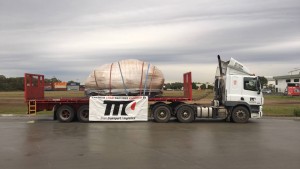
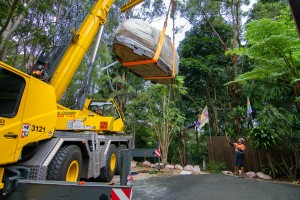 Top: The Crystal makes its way from Brisbane to the Crystal Castle. Above: Careful unloading of the precious stone. Photos: Toby King.
Top: The Crystal makes its way from Brisbane to the Crystal Castle. Above: Careful unloading of the precious stone. Photos: Toby King.
This massive geode was created 120 million years ago, in northern Uruguay, South America, when a giant bubble formed inside a molten lava flow. Through intense pressure, heat and the presence of iron, millions of tiny amethyst crystals began to grow.
“When a farmer discovered this massive geode, we just had to go and check it out,” says Naren, who took his daughter Manya with him to see the geode for themselves. “We found this geode so awe inspiring, we knew we had to bring it home. This magical creation of Nature is our gift to the Crystal Castle in her 30th year. We couldn’t have done it without the guys from Universal Cranes – who got the cave safely off the truck and into position,” says Naren, “and also to Brad and Daniel from Cargo Network International, who have been our trusted import partners for 25 years, and to Interport depot’s Mick & Kath and their team for the epic seven hours of unloading. It was truly a team effort all the way.”
The post The largest amethyst geode ever found arrives at the Crystal Castle appeared first on .
]]>The post Koalas at the Castle and all’s well with the world… appeared first on .
]]>“Over the past year or two the most requested addition to our animal park were koalas,” said Gilding today, while he watched River, the first koala into the new enclosure, settling herself down to a big old feast of fresh new gumtree tips brought in that morning from Lismore.
“We’ve been working with the Friends of the Koala in Lismore,” Gilding said. “They already have the gumleaves we need growing for the local koalas, and so we have a constant supply for River and Eliza.”
And boy, will they need a constant supply – approximately 200kgs a week according to Gilding’s reckoning. But trailor loads of gumleaves is a small price to pay for the permanent addition of the koalas, who recently made the journey from Taronga Zoo to the Macadamia Castle, as part of the Castle’s long-term direction to increase the native wildlife component of the Castle.
“The sad fact is that koalas are under serious threat in the Northern Rivers,” Gilding said while we waited for Eliza to make her appearance. “Their habitat is under constant threat, and we want to see the Castle play a part in educating locals as well as visitors about the importance of protecting such an important Australian icon.”
It wasn’t a long wait until the keepers reappeared with another massive travelling box, and after the member for Ballina, Tamara Smith, had done the honours, the door was opened, and within a few minutes Eliza took her first somewhat shy steps into her new abode. It wasn’t long, though, before she was literally, a koala up a gumtree, and even though she and River were well acquainted at Taronga, a few exciting moments ensued while we were treated to them shrieking at each other like banshees and for an animal better known for its sleeping ability, a remarkable display of koala martial arts. In fact, I had no idea that koalas could be so lively for so long.
There’s another great initiative at the Castle too which is attracting attention – the brand-new ‘lodge’ – a self-contained cottage which can sleep a family of six. Situated right next to the animal park, the rate includes park entry which means that families can go in and out as many times as they like. Perfect family entertainment.
For more information on the Macadamia Castle go to: macadamiacastle
For more information on the accommodation go to: https://airbnb.com/rooms
The post Koalas at the Castle and all’s well with the world… appeared first on .
]]>The post Zentveld’s Biggest Morning Tea appeared first on .
]]>The Biggest Morning Tea raises vital funds for cancer research and support services. If you’ve ever wanted to sit with a coffee and admire the stunning vista at Zentveld’s then now is your chance! There will be delicious home baked goodies on offer (feel free to bring a plate of whatever deliciousness you can create!) as well as fine leaf teas, our superb local coffee and fab raffle prizes. We will be roasting our award winning coffee on the day too so come and have a tour! Cost is $8 per person – this includes a cup of coffee/tea/chai/hot choc and piece of cake or savoury treat. If you can’t make it on the day you can still donate through the following link. Dig deep if you can and together we’ll beat cancer.
cancercouncilfundraising.org.au/zentveldscoffee
Biggest Morning Tea at Zentveld’s Roastery: May 25
193 Broken Head Rd, Newrybar
8.30am – 11.30am
Cost $8 – ALL funds raised go to Cancer Council
The post Zentveld’s Biggest Morning Tea appeared first on .
]]>The post Creative Writing at the Crystal Castle – new course starts May 10 appeared first on .
]]>“You will LOVE this six-week journey of creative self-discovery,” says Candida. “Come and kick-start your writing projects at the Castle, enjoy the company of a small group on the beautiful cafe verandah, and delve into a wonderful journey of self-discovery.”
“This course is inspirational – it will change your life.” Cecilie Brown, Spain
Candida, who started Verandah Magazine 18 months ago, is the author of numerous books including the non-fiction series Yacker, Australian Writers Talk About Their Work; two novels, The Hidden and Women and Horses; a book of short stories, The Powerful Owl, numerous anthologies and several children’s books.
Creative Writing
With Candida Baker
Creative writing courses for women:
Come on a six week journey of self-discovery
At the beautiful Crystal Castle & Shambalah Gardens.
Dates: Tuesday May 10 – Tuesday June 21
Course cost: $360.00 – includes Castle entry and morning tea
Times: 10.00-1.00pm
Candida Baker is a publisher, editor, photographer,
and the author of numerous fiction,
non-fiction and children’s books. She has an MA in Art History.
For more information and bookings email [email protected] or
Call: 0401056894 – or visit www.candidabaker.com
As a journalist Candida has been editor of The Weekend Australian Magazine, deputy editor of the Good Weekend; arts editor of the Sydney Morning Herald and a feature writer on The Age for seven years. She was Director of the 2011 Byron Bay Writers’ Festival, and since then she has run numerous events and workshops in the Byron Bay region.
“Candida has worked with me for a year on my personal memoir, guiding me through the writing, editing and publishing processes. She’s been a great teacher – patient and inspirational. She’s helped me understand the difference between writing words and ‘being a writer’. I can highly recommend Candida – writers and would-be writers will truly benefit from her courses.” – Anna Middleton
“This is the Queen Bees Knees of writing courses – Candida really knows how to support people to achieve their creative goals.” India Morris, Lismore
To find out more about Candida Baker’s books go to: candidabaker.com/author
The post Creative Writing at the Crystal Castle – new course starts May 10 appeared first on .
]]>The post Father and son moment in the rapids of life on the Nymboida River appeared first on .
]]>Years ago, my son Levi and I spent a day riding inflated rubber inner tubes down the Nymboida Creek rapids. The man-made rapid course being shallow, easy-grade rapids and safe were a blast but not exactly challenging. We promised ourselves that one day we would go back and join a group led by expert instructors on the wild Nymboida River and take on some natural rapids in a canoe. So recently we did exactly that.
We arrived at the Nymboida Canoe Centre at eight-thirty as instructed, and after the instructor had fitted us out with personal floatation vests and helmets the entire group of eight participants (under the supervision of four instructors) came together to discuss safety, learn about correct use of equipment and to see dry-land demonstrations of various paddling techniques. With basic instruction out of the way, we were all loaded into a bus to be transported to Hull’s Farm, our beautiful rocky beach starting-point. In a quiet section of water near the launch point, just before heading down river to attempt our first rapid, the instructors led us through half an hour of practicing the various paddling skills we would require throughout the day.
“Levi and I agreed that even though it would have been desirable to make it through the rapid with the boat and us on top of the water, it was also fun to be thrown from the craft and swished down the river amongst the rocks at an enormous rate…”
We also learned that the forward-seated paddler used significantly different paddling techniques to the rear-seated paddler (the forward seat’s role being more of an engine and the rear seat being more of a rudder for the craft) when negotiating the boat through fast-moving water. The lead instructor then gave us all some very specific instructions on how he intended to guide us safely through each rapid section and emphasized how important it was for us to follow his instructions and guidance as closely as we could. When participating in an adventure like this it is great to know that it’s your own skill and effort that is going to bring you safely through the hazards but at the same time it’s reassuring that there are experts on hand doing everything they can to ensure that you get things right!
We were formed up into single file, spaced about four boat-lengths apart, and sent on our way paddling steadily towards our first challenge. Levi and I both heard the grumbling and gurgling sound of the rapid well before we actually saw it. The first rapid section was approached one boat at a time with each craft called into the rumbling white water with a single blast from the leader’s whistle.
When our turn came I confess that that my heart rate increased just a little as we headed for the white water. About five metres before we actually reached the churning wash of the rapid we could feel the craft come into the grips of swiftly moving water. It’s a strange sensation to be in control of a vehicle at one moment then to deliberately paddle the craft into a place where the river is attempting to wrench control away from you. Once you’re five metres from the rapid it’s too late to think, “Oops, I’ve changed my mind…I think I’ll come back later…” because once you’re in it, there’s no backing out! We paddled into the fast moving water and felt ourselves whisked along to the place where the water seemed suddenly to fall out from under us.
I shouldn’t make this rapid sound too dramatic. It was just a teeny one and being an easy Grade One rapid every boat made it through the boiling water with a minimum of fuss. Other than the fun of taking on a rapid for the first time and the thrill of travelling down the river at speed while dropping through a maelstrom of rocks and white water the main lesson learned was that the canoeist’s role is not a passive one. If a canoeist allows their shock and awe to distract them from paddling strongly (to both power and steer the craft) the river remains in control and making it through the rapid becomes a matter of luck rather than skill.
Despite having learned this lesson (and thinking that we had learned it well) we showed just what pathetic, puny creatures we were when we came to the first Grade Two rapid only a few more hundred metres down the river. The guides did a fantastic job in ensuring that we had every chance to succeed at our first real challenge, the Fisherman’s Hut rapid. The lead instructor left his craft on the bank then carefully made his way out into the middle of the torrent so he could point to a spot precisely where he thought it would be best for us to take the first drop. He also sent his senior assistant instructor ahead and asked her to position herself at a place in the water some distance down-stream so that we not only had a potential rescuer in place but also a target that we could aim our crafts towards down the line of the river most likely to be safe.
Each craft was to take on the rapid one at a time with enough space between the boats to enable instructors to ready themselves for any possible rescue that might be needed. Levi and I were first to attempt the rapid, and a sad attempt it was. We paddled towards the first drop with excitement and enthusiasm. The moment the canoe dropped over the edge, the shock of the feeling of weightlessness and the sudden increase in velocity, caused us both to back off on our strong paddling causing the canoe to waddle and wobble on, out of control, for a few seconds. By the time we had both started to paddle again and were rattling along at high speed, we found ourselves heading towards an ill-placed tree that was overhanging the gurgling banks of the river. Levi, thinking that he was about to lose his head, was forced to duck and stop paddling and I, feeling the craft out of control, stopped paddling too. Silly move, that. The next thing we knew we were upside down and bouncing down the river, separated from our craft. When the white water settled back into a slow moving river, the assistant instructor was right at our side helping us to gather ourselves together, helping us to find our paddles and helping us to manoeuvre our boat to the bank where we could empty it of water and prepare ourselves for the next challenge.
The first big challenge was out of the way. Some did well. Others not so well, but every one of us had had a ball. Levi and I agreed that even though it would have been desirable to make it through the rapid with the boat and us on top of the water, it was also fun to be thrown from the craft and swished down the river amongst the rocks at an enormous rate before being deposited safely in a calm eddy with enormous grins on our faces.
Canoeing is satisfying. You learn new physical and mental skills and you need to apply those skills at every moment of the journey. Walking away from a sixteen-kilometre journey with dozens of challenges along the way and doing it through having learned and endured is enormously satisfying!
Throughout the journey the instructors called a halt to all activities at regular intervals so that we could all could cool down, regenerate and relax with swims, lots of drinks, food and games. But as is the case with most adventures, it’s not just about the adrenaline-charged fun. The Nymboida rapid adventure is also about nature. The river. The country. The animals. The wildness – and the wilderness.
After seven hours of exhilarating and challenging activity we finally paddled our canoes into Buccarumbi where the bus was waiting to carry us back to the canoe centre. Buggered, burnt and bitching about the heat most of us were glad to finish the trip but also thrilled to have been part of it.
Precautions
When you book a trip on the river make sure that you get a full list of instructions on what you will need. My tip is to wear long shirtsleeves and long trousers (I didn’t do this and boy I regretted it) and bring a hat to wear under the helmet provided. Six or seven hours on the river means you’ll need as much sun protection as you can get. Without taking precautions and reapplying sunscreen all day long you’ll fry. Don’t worry about the long trousers and shirt being too hot. You will be regularly swimming in your clothes (whether by accident or by design) and the wet fabric helps to keep you cool. You will also need lots of cold water and snacks as well.
Fitness
Any adult or teen with average fitness will manage the sixteen kilometres with no problems. You might have a little muscle soreness the next day but that will just make a great a reminder of the wonderful adventure you’ve just had. If you currently enjoy a completely sedentary lifestyle then you had better check with your doctor first before undertaking this adventure. Failing that, do yourself a favour and get down to the local gym and start a fitness program. It would be pretty annoying for yourself, for your fellow paddlers and for the instructors if you get half way down the river and realize that you are done with and need help to make it to the finish.
Verdict
Everyone should have a crack at paddling on a wild river at least once in their life. At worst you will end up a bit sore, hot and tired but you’ll be pleased that you had the experience. You might even discover that this is the sporting life you want to live from now on – canoeing may just be the start of a new passion!
Review: Adventure – white water canoeing
Place: Nymboida River (Hull’s Farm to Buccarumbi) – approximately two and a half hours drive from Byron Bay, 35k’s from Grafton. For more information go to nymboidacanoecentre
Distance on the river: 16.3 K
Guides: Nymboida Canoeing Centre – Senior Instructors: Gray Stride and Gaye Foster – Assistant Instructors: India Morris and Courtney Bryce
Water Craft: Wobbegong 4.3 M
Contact details: 3518 Armidale Road, Nymboida, NSW 2460. Tel: 02 66494155
The post Father and son moment in the rapids of life on the Nymboida River appeared first on .
]]>The post Education (and fun) at the magical Macadamia Castle appeared first on .
]]>Many years ago, on our first family holiday in Byron, we were driving from Ballina airport in our hire-car, when I spotted what looked like a medieval castle up ahead, with a giant knight, fully equipped in armour standing out the front.
“What on earth is that?” I said, and our then-eight-year-old son of course immediately wanted to stop, then and there.
Little did I know at that point that the Macadamia Castle would, in the future, become a place of almost weekly visits, when a family pass was essential. Little did I also know that I would become adept at mini-golf, and even less did I know that 15 years later, with my children fully-grown, I would be there as an honorary (if ancient) participant in two holiday workshops, Wildlife Guardians (for seven to eleven year-olds) and Keeper for a Day (for twelve to eighteen year-olds).
I couldn’t have possibly guessed how much fun it would be tagging along with the workshops, or how much I would learn. As a long-time guinea-pig owner when I was a child in England for instance, I never knew that that little guinea-pigs like orange, or that in fact they have very high vitamin C needs, and so, particularly if they don’t have much access to natural grasses and clover, oranges are an essential part of their diet.
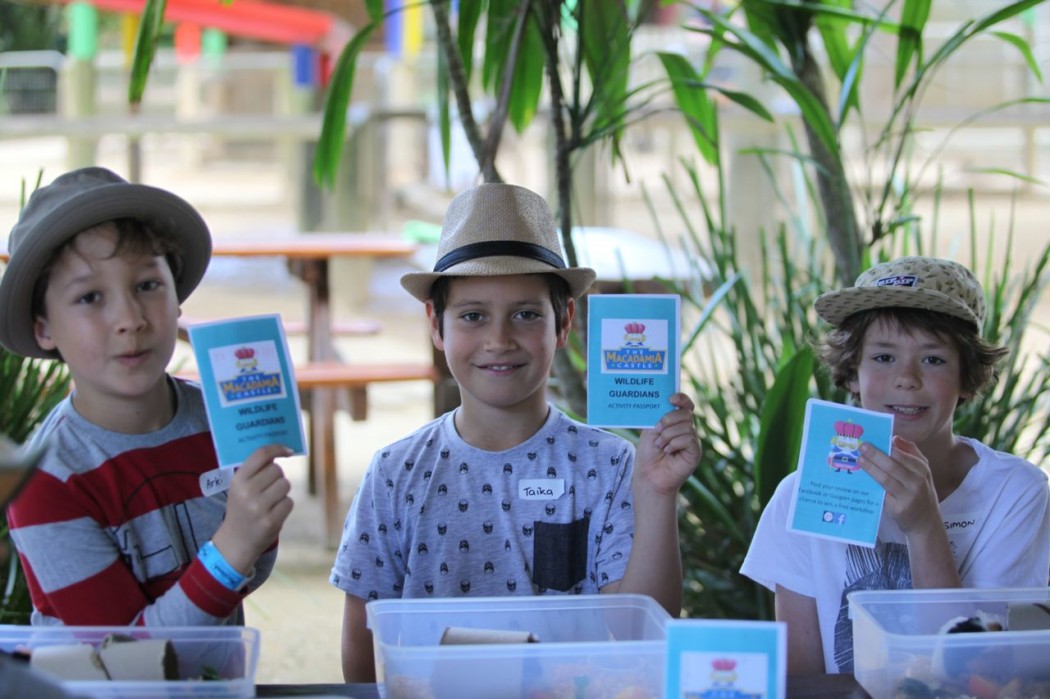
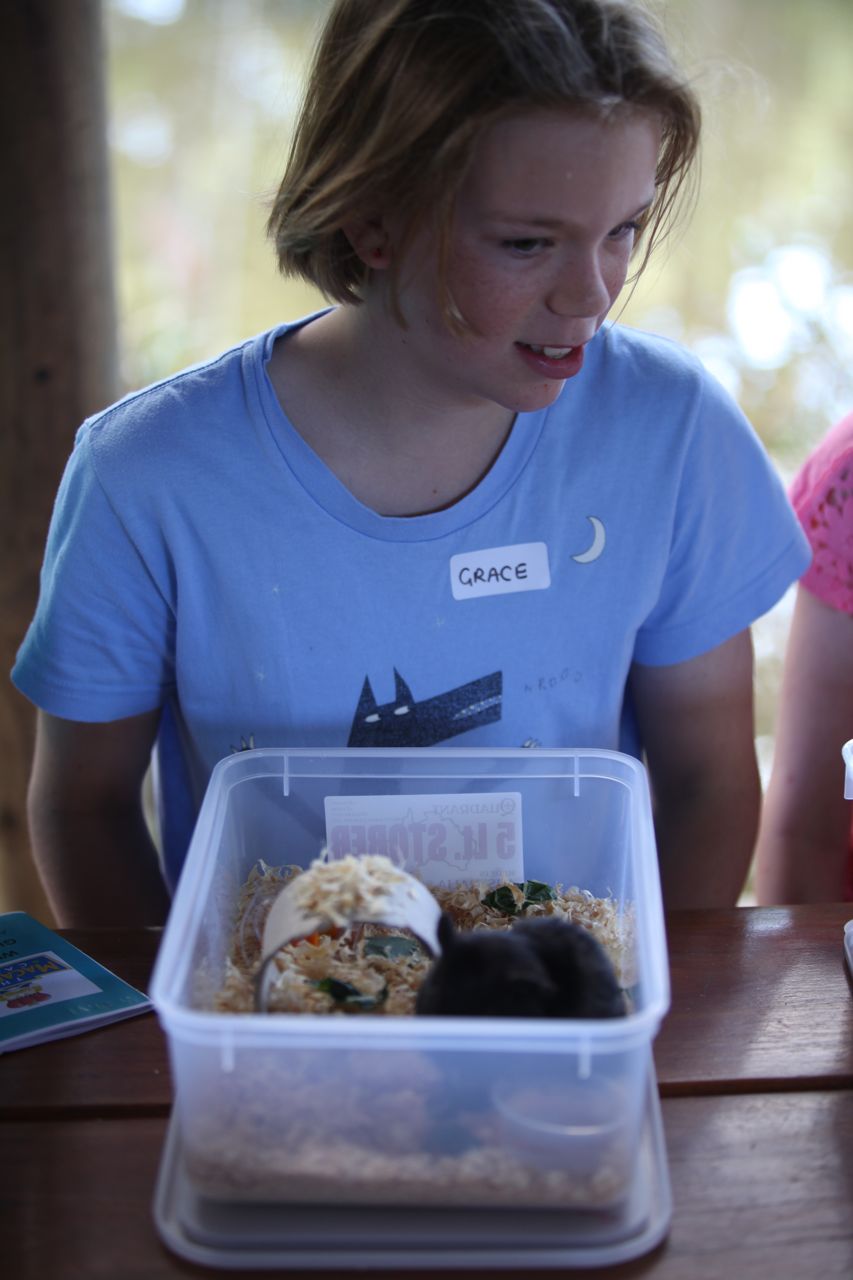
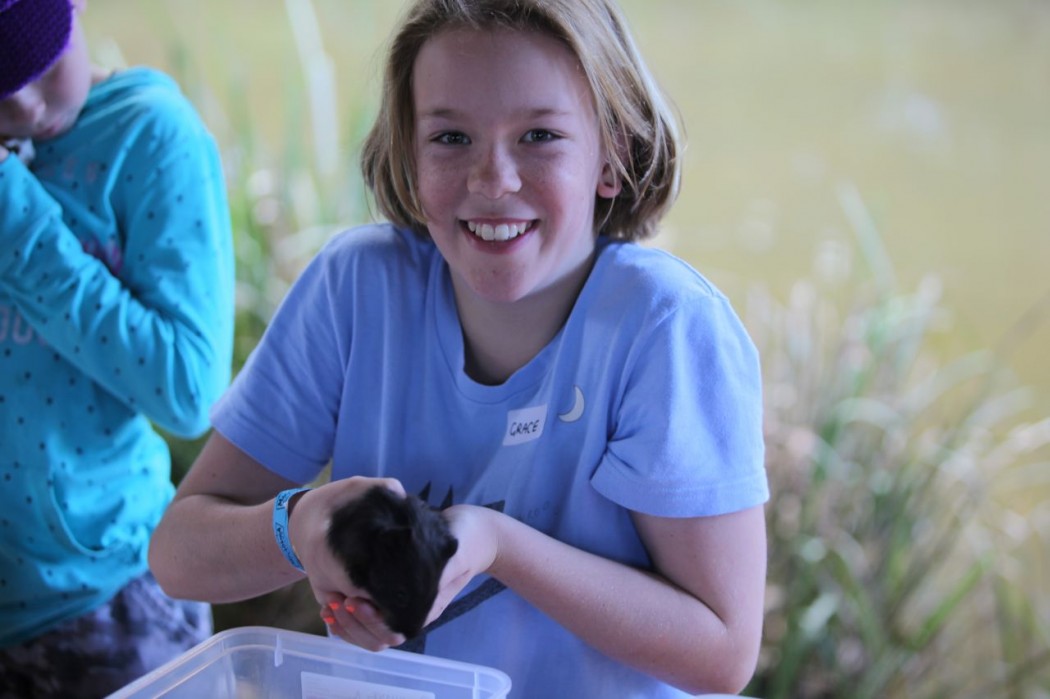
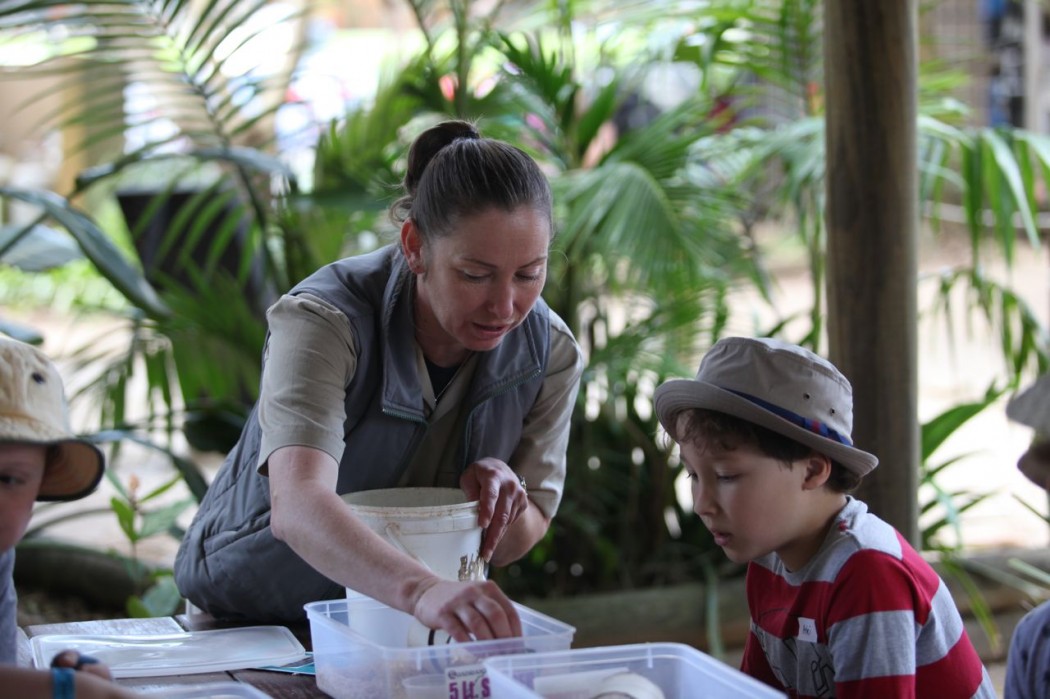
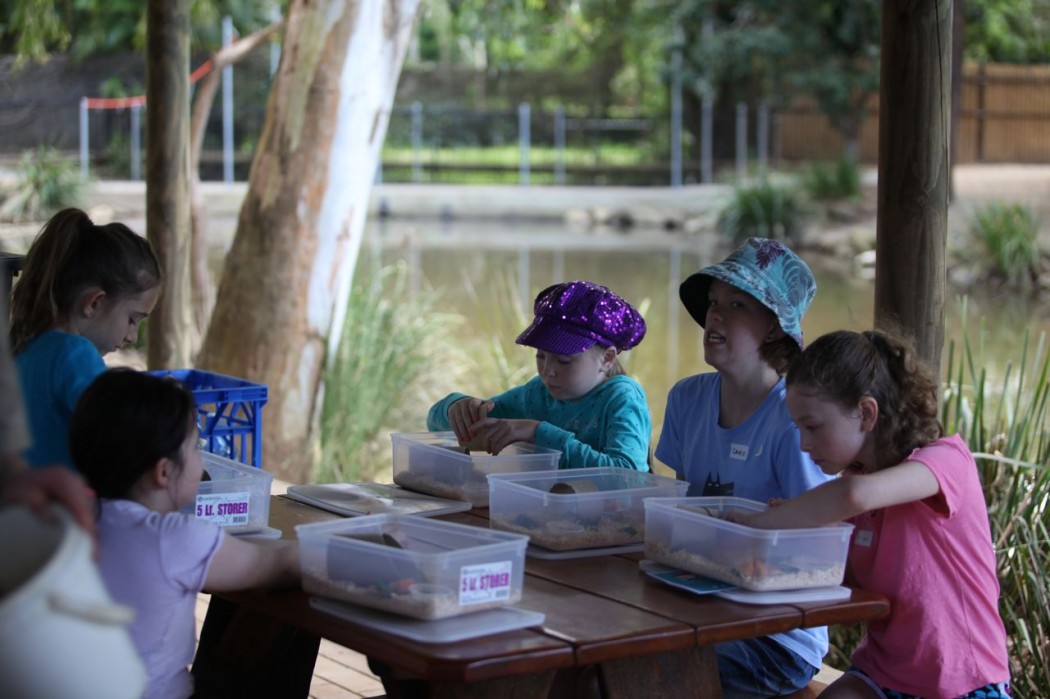
The participants in Wildlife Guardians create enrichment enclosures for their guineapigs under the watchful eye of Keeper Georgia Shapter.
Also (and I can already hear the cries of disbelief, but it’s true), I never knew – or more correctly had never stopped to think about the fact – that kangaroos and emus can’t walk backwards, and this is why they’re on our Coat of Arms, because Australia must go forward, which of course suddenly makes much more sense of Advance Australia Fair, the anthem to which none of us can ever remember the words. (Well, at least I can’t.)
I’m in the company of senior keeper Georgia Shapter, who is in charge of the young Wildlife Guardians holiday workshop, and the next day’s Keeper for a Day. Georgia, who has worked at the Castle for 15 years, knows all the animals by heart. (And for those of you who may have wondered if Elvis the blind goat had passed away – he’s living his life out on a property and is still very much alive.)
The young Wildlife Guardians had a ball creating ‘enrichment’ enclosures for their guinea pigs, with cardboard tubes, fresh sawdust and food, and lots of behavioural comparisons. The wombat’s life was also very much enriched by the hiding of parcels of fresh corn in her enclosure, and by the time she’d finally worked out where they all were, it was time for some alpaca behavioural training, because, said Georgia, he’d developed a dislike of the keepers in their uniforms, although he was very friendly towards the visitors.
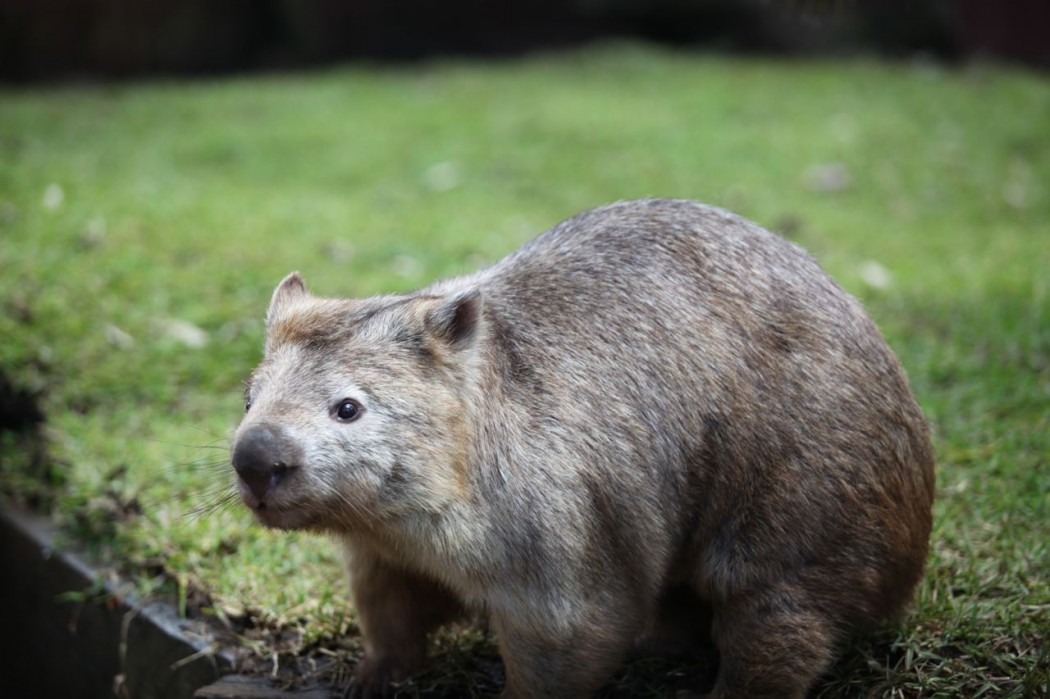
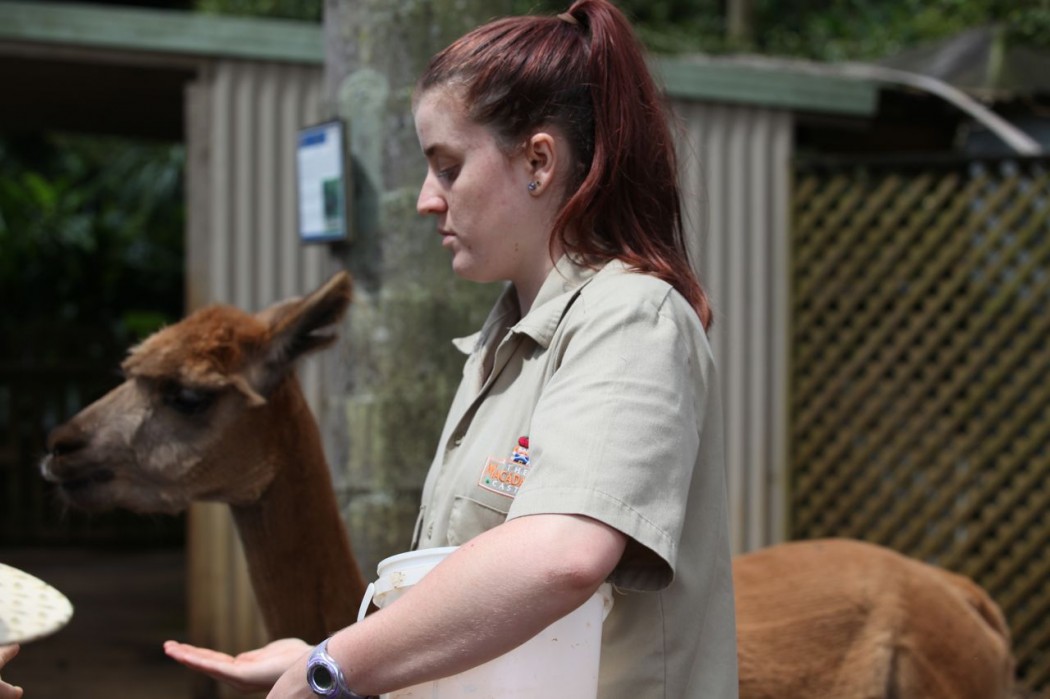
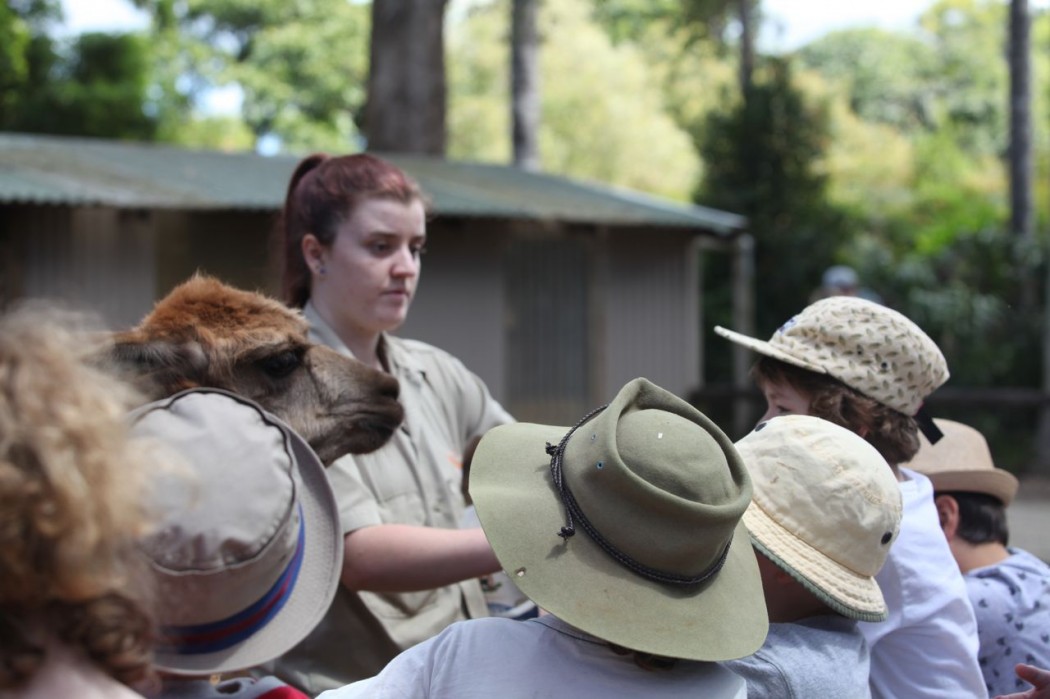
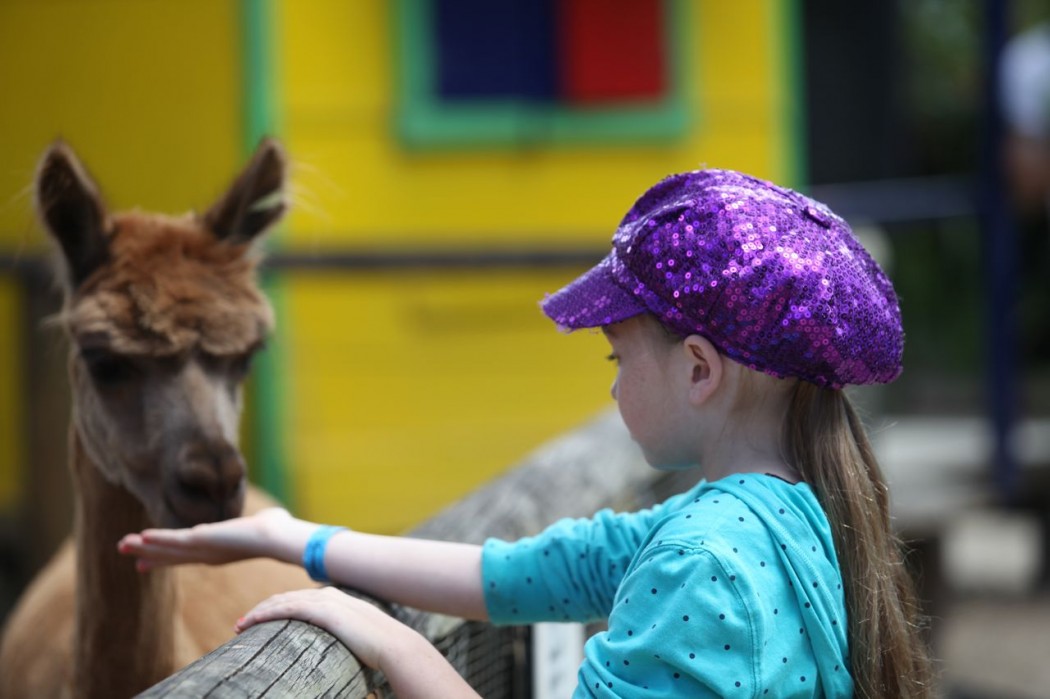
“It’s because we have to put tick collars on him,” she told me, “and also we have to shear him, which he isn’t very keen on.” The behavioural training was designed to reintroduce him to the idea that the keepers could be nice too! “We just want him to realise that we come with treats,” she said, a touch sadly.
The next day the young keepers-in-training learned some of the harder facts of life – that, for instance, 80% of a keeper’s job, is clearing up animal poo. The kind of fact that is going to quickly weed out the animal lovers from those who really want a career in animal care. Being older, they were able to help with food preparation and to have a greater interaction with the animals.
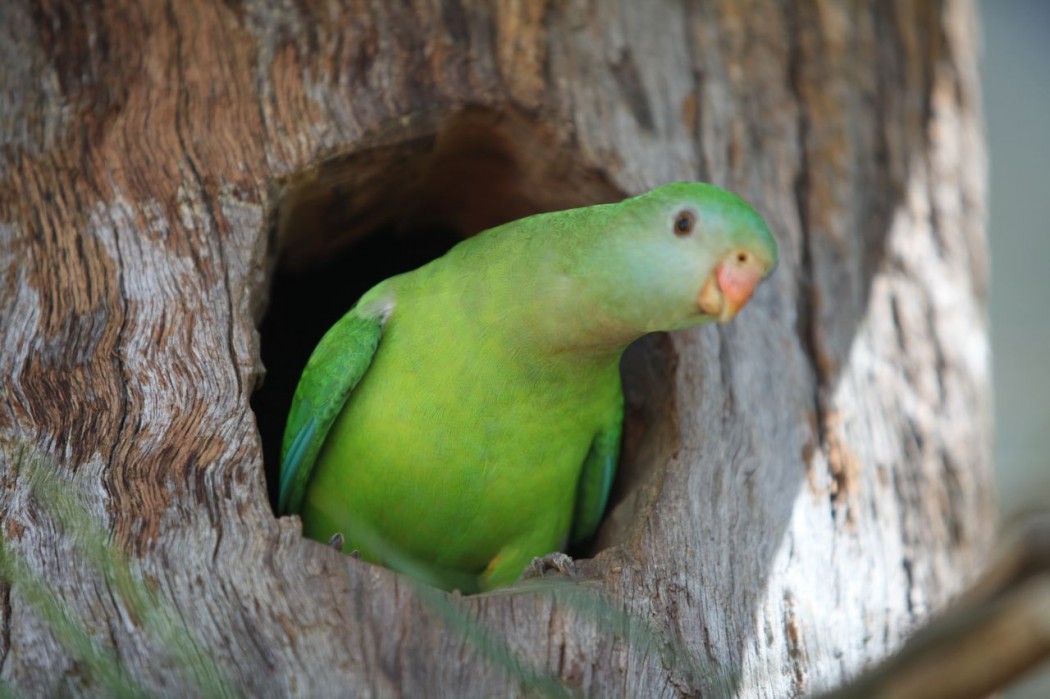
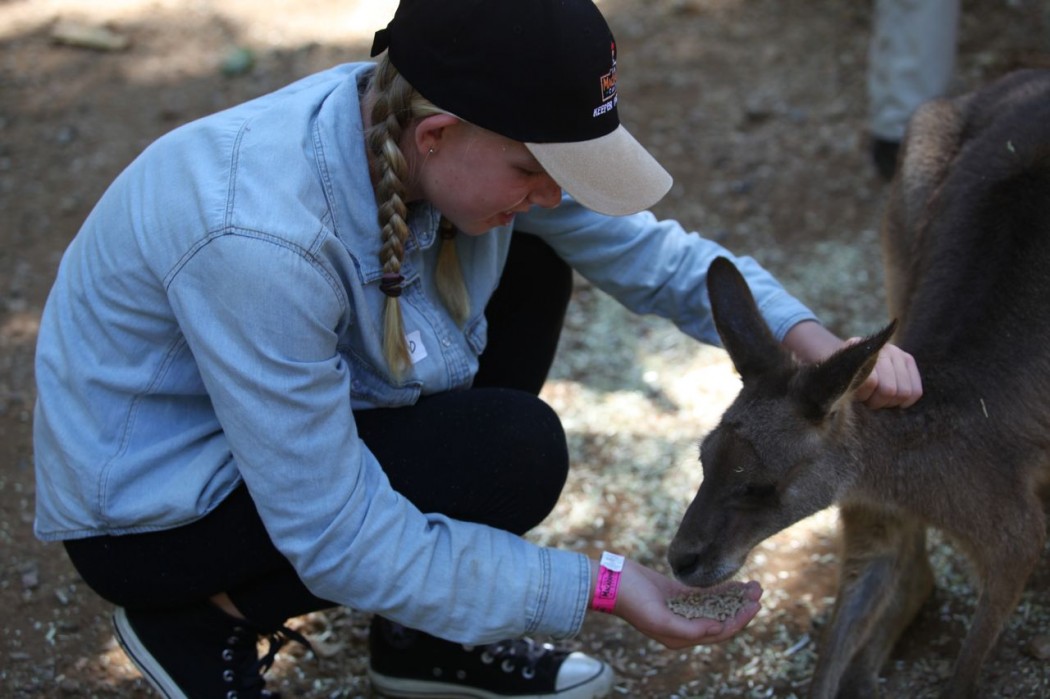
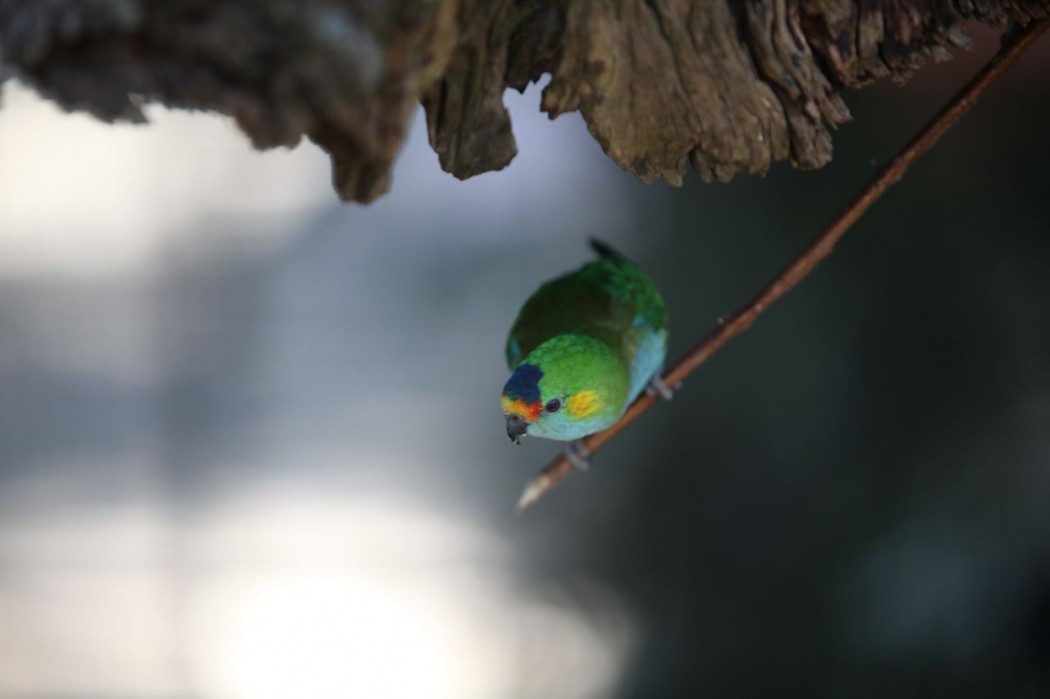
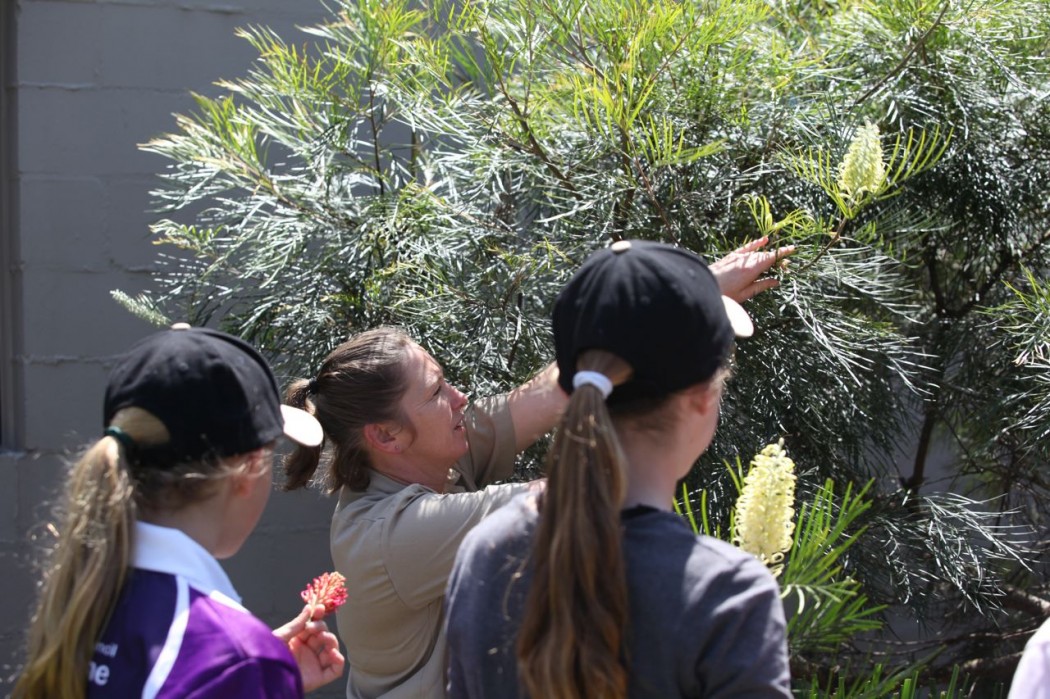
“We’ve been thrilled with the fact that quite a few kids who’ve done Keeper for a Day have then made a choice to go on and work in the industry,” said Georgia.
Without a doubt, the whole group said, their favourite place was the aviary, where they were able to go to town with their interior decorating skills, placing grevillea and bottle brush blossoms so that the parrots could indulge their sweet tooth.
What they’d learnt, which had surprised them, was how carefully sterilized all the bottles and feeding equipment for the baby animals had to be. “We have to take every precaution with the babies,” Georgia explained. “Particularly because many of them have been orphaned and they don’t have the same immunity they would have if they were in the wild with their mothers.”
Of course, while the workshops were going on, the everyday business of the Castle was underway as well – and being the holidays it was in full swing, but these workshops are part of a new initiative towards education that the Macadamia Castle management are exploring.
“We’re surveying customers to find out what they want to see,” said Georgia, “and whether perhaps we move more towards being a native animal park so that we can better educate Australians – and visitors to Australia about the amazing wildlife we have right here on our doorstep.”
The Macadamia Castle, along with the kangaroo and the emu, is marching forward, although I’m sure the massive knight-at-arms who still colourfully guards the entrance, isn’t going anywhere in a hurry.
Photographs and text by Candida Baker
For more information on holiday workshops or general information call the Macadamia Castle on 6687 8432 or go to macadamiacastle
The Macadamia Castle is open seven days a week, 8.00 am to 5.00 pm. Workshops take place during the holidays and there are limited numbers of places.
The post Education (and fun) at the magical Macadamia Castle appeared first on .
]]>The post Richard Jones and the Power of Pottery appeared first on .
]]>When Richard Jones unloaded his latest arrivals from the kiln in time for Open Day at his Possum Creek studio he couldn’t have been more pleased.
“It looks like a sea of bowls,” says Jones. “The celadons did really well on the raku clay, and the shinos did all sorts of weird and wonderful things – as shino does.”
It was Jones’s partner Jo Immig, who coined the word ‘plowls’ for the fabulous double-fired three-glaze plate/bowls above. “We use them all the time now,” says Jones. “They’re wonderful for eating off. I was very pleased with this batch, the copper reds can be quite tricky and can end up bright blue if the firing doesn’t work!”
“These cups, or glasses are porcelain inlay on raku clay,” says Jones. “I carve the design- sometimes quite random-and fill it with porcelain. When it’s partially dry I scrape off the surplus to reveal the design. I started doing this as an experiment and discovered it was called Mishima in Japan.” For Jones part of the appeal of pottery is the constant experimentation. “It’s led me to creative places I could never have imagined when I started,” he says.
Jones call these his ‘star bowls’, and says they are reminiscent of his galaxy paintings. “I’ve stocked up for the Open Studios day,” he says. “I love it when people visit me here where I live and work – it’s all about getting back in touch with nature. There’s the roosters, Sebastian, Rupert and Alisdair; the brush turkeys – if you’re lucky the koalas – sometimes a python curled up asleep, and hundreds of bird varieties.”
“Each piece – including the five dollar pieces will save several hundred rainforest trees in Sumatra thanks to Kelvin Davies and the Rainforest Trust,” says Jones, and for him the Open Day is not just a chance to show off his incredible range, but with every bowl sold, he knows one more piece of rainforest has been saved.
Richard Jones studio is at 56 Gittoes Lane Possum Creek and will be open this weekend, Saturday and Sunday from 10.00am to 4.00pm.
The post Richard Jones and the Power of Pottery appeared first on .
]]>
